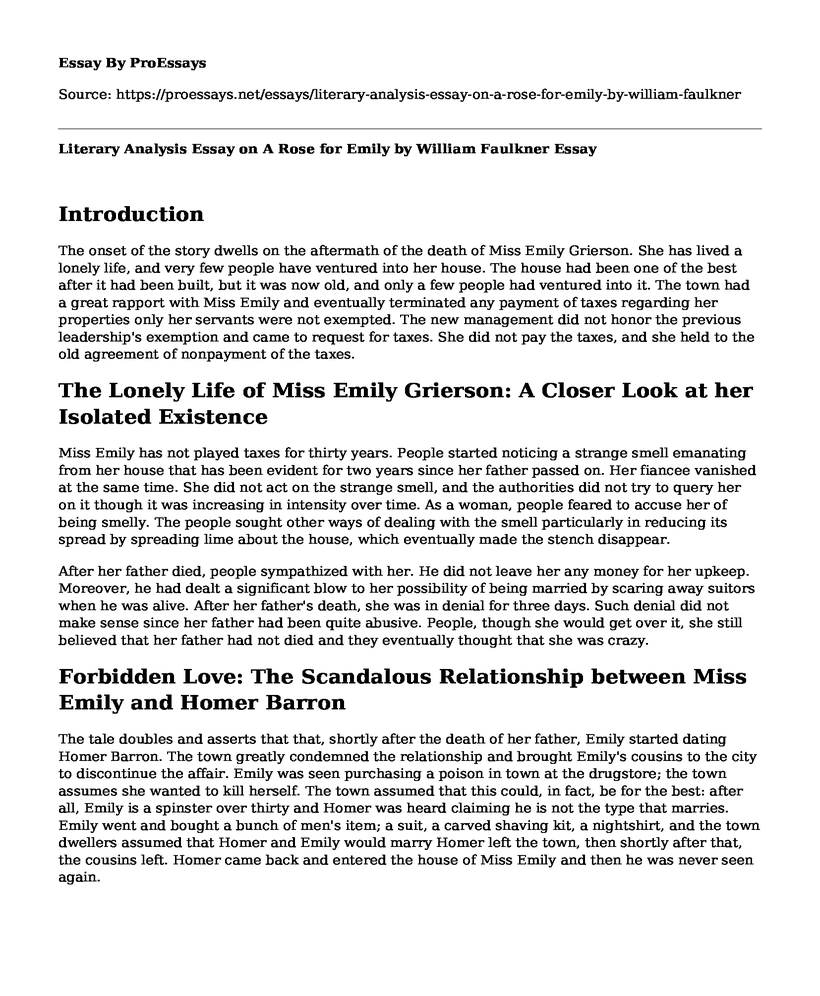Introduction
The onset of the story dwells on the aftermath of the death of Miss Emily Grierson. She has lived a lonely life, and very few people have ventured into her house. The house had been one of the best after it had been built, but it was now old, and only a few people had ventured into it. The town had a great rapport with Miss Emily and eventually terminated any payment of taxes regarding her properties only her servants were not exempted. The new management did not honor the previous leadership's exemption and came to request for taxes. She did not pay the taxes, and she held to the old agreement of nonpayment of the taxes.
The Lonely Life of Miss Emily Grierson: A Closer Look at her Isolated Existence
Miss Emily has not played taxes for thirty years. People started noticing a strange smell emanating from her house that has been evident for two years since her father passed on. Her fiancee vanished at the same time. She did not act on the strange smell, and the authorities did not try to query her on it though it was increasing in intensity over time. As a woman, people feared to accuse her of being smelly. The people sought other ways of dealing with the smell particularly in reducing its spread by spreading lime about the house, which eventually made the stench disappear.
After her father died, people sympathized with her. He did not leave her any money for her upkeep. Moreover, he had dealt a significant blow to her possibility of being married by scaring away suitors when he was alive. After her father's death, she was in denial for three days. Such denial did not make sense since her father had been quite abusive. People, though she would get over it, she still believed that her father had not died and they eventually thought that she was crazy.
Forbidden Love: The Scandalous Relationship between Miss Emily and Homer Barron
The tale doubles and asserts that that, shortly after the death of her father, Emily started dating Homer Barron. The town greatly condemned the relationship and brought Emily's cousins to the city to discontinue the affair. Emily was seen purchasing a poison in town at the drugstore; the town assumes she wanted to kill herself. The town assumed that this could, in fact, be for the best: after all, Emily is a spinster over thirty and Homer was heard claiming he is not the type that marries. Emily went and bought a bunch of men's item; a suit, a carved shaving kit, a nightshirt, and the town dwellers assumed that Homer and Emily would marry Homer left the town, then shortly after that, the cousins left. Homer came back and entered the house of Miss Emily and then he was never seen again.
Conclusion
Emily rarely left home after that. She was never really seen again, only after six years when she was giving a painting instruction in her parlor. She added weight, her hair grew grey, and she finally died in a downstairs bedroom that had no light for several years. It was massive temporal leap time again: the narrative goes back to where it started, at her memorial service. Miss Emily's servant, Tobe, let in the town dwellers and then left by the back door. He was never seen again. After the memorial service, and after Emily's burial, the town's dwellers went upstairs to break into the room that had been closed for close to forty years. Inside, they found the cadaver of Homer Barron. Next to Homer, on the dust of the pillow, they found a dimple of a head and a long, gray hair in the indentation.
Works Cited
Faulkner, William. A Rose for Emily and Other Stories. Random House Publishing Group, 2012.
Cite this page
Literary Analysis Essay on A Rose for Emily by William Faulkner. (2022, Apr 14). Retrieved from https://proessays.net/essays/literary-analysis-essay-on-a-rose-for-emily-by-william-faulkner
If you are the original author of this essay and no longer wish to have it published on the ProEssays website, please click below to request its removal:
- The Theme of Perseverance in "The Valley of Detachment"
- The Short Story of Junot Diaz Essay Example
- Literary Analysis Essay on Satan's Heroism in 'Paradise Lost'
- Essay on Iliad and Odyssey: Exploring Human Struggles in Epic Poetry
- Film Analysis Essay on Hamlet Starred with David Tennant
- The Role of Fate in the Iliad Essay Example
- Isaac Asimov: Exploring Robotics With 'I, Robot' & 'Reason' - Essay Sample







